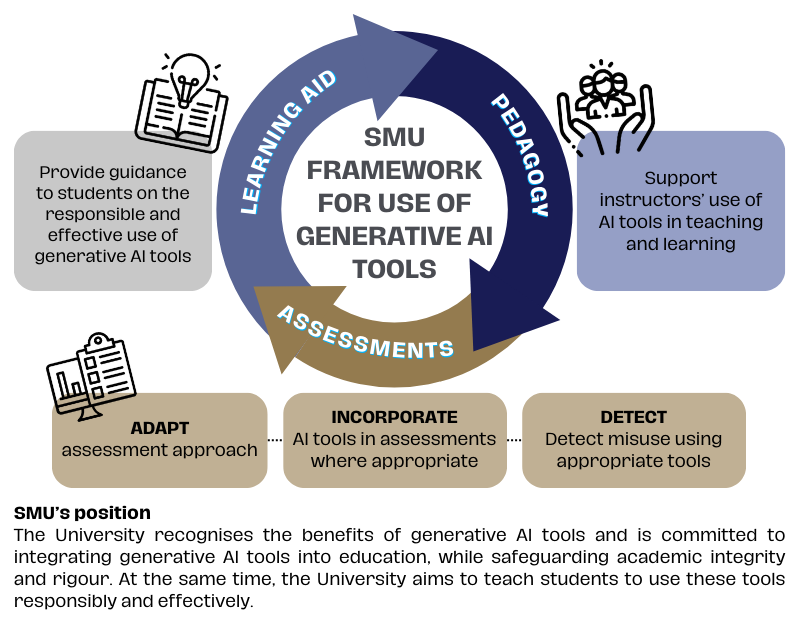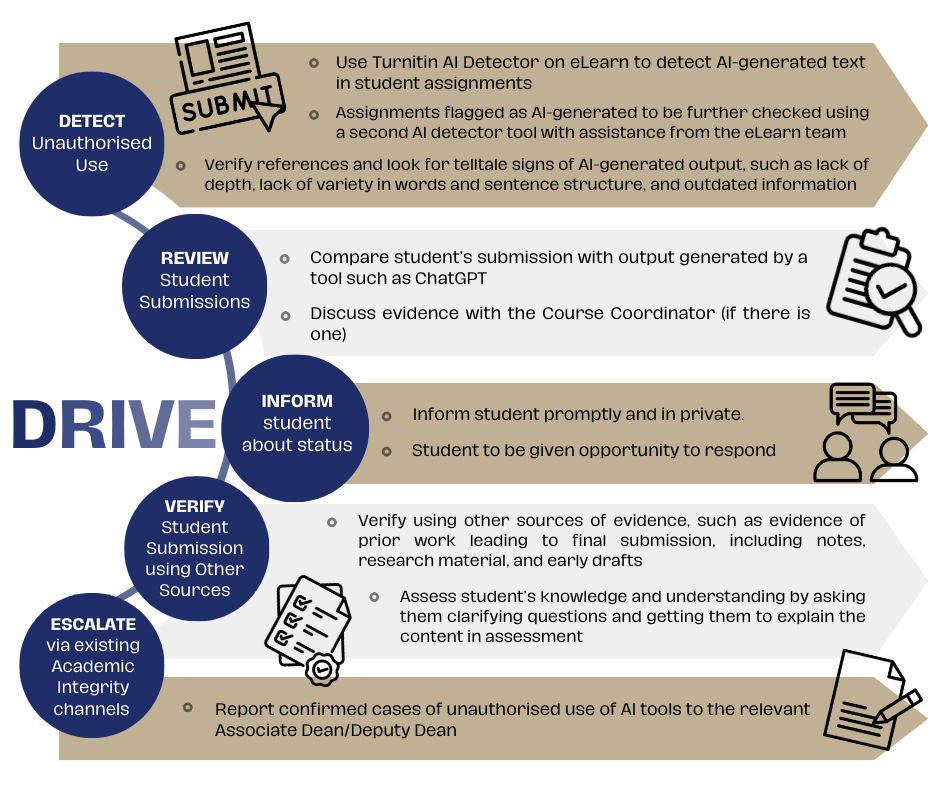Introduction
Singapore Management University has developed a Framework for The Use of Generative Artificial Intelligence (AI) Tools which aims to provide guidance on how the SMU community can use such tools, and where resources should be channeled to ensure the responsible and effective use of generative AI tools. It provides the University’s position on the use of generative AI tools, as well as its use in the following specific contexts: [i] as a learning aid for students or [ii] as a pedagogical tool for instructors, and [iii] in assessments.
University's Position on the use of Generative AI Tools
The University recognises the benefits that generative AI tools bring and its increasing presence in our everyday lives. Our students will build their careers in a world where AI tools will be increasingly pervasive and it is incumbent on us to teach students how to interact with such tools in an effective and discerning way. With fast evolving technologies like AI, our response is not to shy away from it, but to assess how we can harness the best of what it can offer and adapt the way we teach and approach assessments to prevent misuse. We are committed to exploring ways to integrate generative AI tools into education, but at the same time safeguard academic integrity and standards of academic rigor. For this reason, ensuring the responsible and ethical use of generative AI tools must be part of our response.
The framework

Use of Generative AI Tools by Students as a Learning Aid
Generative AI tools have the potential to enhance students’ understanding of knowledge leading to better learning outcomes. Nonetheless, students need to be made aware of the limitations and ethical use of such tools.
The Student Success Centre has launched the Guide to Learning with AI online module to educate students on how generative AI tools can be used as a learning aid in an effective and responsible manner. This module can be found on eLearn.
Use of Generative AI Tools by Instructors as a Pedagogical Tool
Generative AI tools can lead to improved teaching quality and support instructors to create educational content.
The Centre for Teaching Excellence (CTE) has developed a resource page on the “Use of AI Tools in Assessment and Teaching” for instructors and will be updating it as new information on AI tools arises. In addition, a series of webinars / workshops has been planned to provide support to instructors on the effective use of generative AI tools in teaching, including demonstrating best practices for incorporating these tools in their teaching.
Use of Generative AI Tools by Students on Assessments
The University will address the potential misuse of generative AI tools in assessments using the following three-pronged approach of Adapt, Incorporate, and Detect:
- ADAPT by changing assessment approach
Instructors can adapt by redesigning assessment questions such that they are beyond the existing capabilities of generative AI tools or changing the type of assessments employed.
- INCORPORATE generative AI tools on assessments where appropriate.
Instructors may choose to allow the use of generative AI tools on assessments, where its use can enhance learning. If an instructor chooses to allow the use of a generative AI tool:
- its permitted use must be made explicit to students;
- guidelines for when and how it is to be used should be provided (refer below for more information);
- use of the tool should be credited using a widely accepted format, where applicable, such as the APA Style Guide or Chicago Manual of Style.
- DETECT misuse of generative AI tools with detection tools, as they become available.
SMU instructors should follow the “DRIVE” approach if they encounter suspected cases of students’ unauthorised use of generative AI tools during assessment. Please refer to the section below for more details on the DRIVE approach.
Guidelines for instructors to incorporate generative AI in assessments
Deciding how AI tools can be incorporated into assessment requires balancing innovation with the integrity of learning outcomes. Instructors should first safeguard the core competencies their course aims to develop, restricting AI use in areas where it might replace the very skills students are meant to master. When AI use is restricted, the rationale should be transparent, ensuring students understand how the limitation supports their skill development and academic growth. This section provides key factors instructors should consider in deciding whether Gen AI tools should be incorporated in assessment.
Factors that instructors should consider in deciding when AI should be permitted
- Core Skills: What core skills and knowledge do the assignment aim to develop?
- AI as a Tool: Can AI be used in ways that support, rather than replace, the intended skill development?
- Knowledge vs. Process: Is the assessment testing the student’s ability to derive the right answers or the process of reaching the right answers
- Complexity and Creativity: Will AI’s involvement risk oversimplifying the task, or can it enhance creativity and exploration?
- Current Guidelines: What are your current guidelines for AI use in assessment? Are they well-defined and clearly articulated to students?
- Tool Availability: Do all students have equitable access to AI tools? Would privilege access to certain tools give some students an advantage in the assessment?
- AI Skill Support: Have students been taught how to use AI tools responsibly and critically?
The table below outlines common assessment types in SMU, providing a brief description of each to help instructors and students understand their purpose and expectations.
| Assessment Format | Description |
|---|---|
| Take-home Essay | A written assignment completed outside class, requiring students to research, analyse, and present arguments on a given topic. |
| Coding Projects | Practical programming tasks where students design, implement, and test code to solve specific problems or create applications. |
| Problem Sets | A collection of structured exercises—often in math, science, or quantitative fields—requiring students to apply concepts to solve defined problems. |
Sample Constituent Tasks for Different Assessment Types
The table below outlines sample constituent tasks for take-home essays, coding projects, and problem sets, illustrating the typical steps students may undertake to complete each format effectively.
| Take-home Essays | Coding Tasks / Projects | Problem Sets |
|---|---|---|
|
|
|
The sample table below outlines when AI is permitted, permitted with disclosure, or prohibited for common tasks. Instructors should use this table to plan and clarify the use of AI with clear rationale to guide both instructors and students for each constituent task.
Permit → recommended ways student should use AI for this task
Permit with disclosure → what is required from the student to fulfil the disclosure obligation
Prohibit → Measure to disincentivise or prohibit AI use
| Task | Permit | Permit with disclosure | Prohibit | Details (instructor to provide further direction on task based on the level of AI usage indicated) |
|---|---|---|---|---|
| Ideation | ✓ | Set aside time for students to generate and discuss ideas in class without the use of AI; submit a summary at the end of the discussion | ||
| Draft outline | ✓ | Students are required to start with a generated outline, which they then critique and improve. Disclosure through submitting the generated outline. | ||
| Information/literature search | ✓ | Use Gen AI to search for relevant articles/publications (using tools such as ChatGPT’s web search) |
Use these links to download templates for Take-home Essays, Coding Projects, and Problem Sets.
Communicating Expectations to Students
Instructors should clearly communicate their expectations and policies regarding the use of Generative AI tools and ensure that students understand the importance of academic honesty and originality. For assessments that do not allow students to use generative AI tools, students should be informed of the consequences of violation.
For assessments where the use of generative AI tools is permitted, students should be told the specific areas and tasks where generative AI tools could be applied and what constitutes unauthorised use.
In this link (Statement Templates), instructors can access templates of statements they can adapt according to their requirements:
- Statement to explain the use of Generative AI tools in assessment to students.
- Statements of Declaration for students in assessments where the use of Generative AI is permitted, restricted, partially permitted under certain conditions specified by the instructor.
In the event suspected unauthorised use of Generative AI tools are detected, please apply the DRIVE approach and refer to the Faculty Handbook for Academic Violation.
Instructors may seek guidance from Associate Deans, and also contact the University Council of Student Conduct for more information:
University Council of Student Conduct
Tel : 6828 0885
Email : studentconduct [at] smu.edu.sg
Website : https://smu.sg/UCSC
Unauthorised use of Generative AI Tools in Assessment
The unauthorised use of generative AI tools will be considered cheating – a violation of the SMU Code of Academic Integrity and will be dealt with accordingly. Please refer to the Faculty Handbook for Academic Violations for more information (log in required). Penalties will align with the University's established practices for cheating.
Protocol for reviewing suspected cases of unauthorised use of generative AI tools: The DRIVE Approach

The following section outlines the protocol that SMU instructors should follow if they encounter suspected cases of students’ unauthorised use of generative AI tools during assessment. The protocol is named the DRIVE approach, which is an acronym for:
D : Detect unauthorised use
R : Review student submissions
I : Inform student of status
V : Verify using other sources
E : Escalate via usual academic integrity channels
Details of the DRIVE Approach
| Steps | Remarks |
|---|---|
DETECT unauthorised use
|
Instructors may look out for the following features:
|
REVIEW student submissions
|
|
INFORM student about status
|
Guiding question:'The output from the AI-detection tools suggests that some of your work was AI-generated. I have also independently checked additional examples of AI-generated responses. Are you able to explain why your detection tool output score is so high?' |
VERIFY Student Submission using Other Sources
|
|
ESCALATE via existing academic integrity channels
|